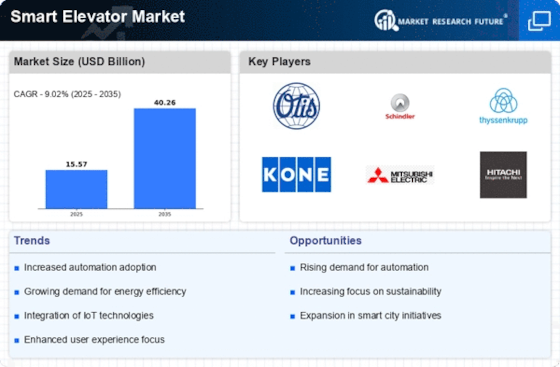Top Industry Leaders in the Smart Elevator Market
 Forget pressing buttons and waiting awkwardly for the clang. The humble elevator has ascended to new heights, entering the age of intelligence. Pulsates with innovation and competition as established giants like Otis Elevator and Schindler Group clash with nimble tech startups, all vying for a share of the vertical transportation pie. Let's delve into the strategies, trends, and recent developments shaping this dynamic landscape.
Forget pressing buttons and waiting awkwardly for the clang. The humble elevator has ascended to new heights, entering the age of intelligence. Pulsates with innovation and competition as established giants like Otis Elevator and Schindler Group clash with nimble tech startups, all vying for a share of the vertical transportation pie. Let's delve into the strategies, trends, and recent developments shaping this dynamic landscape.
Strategies Propelling Market Share:
-
Beyond the Buzzer: Leading companies are expanding beyond basic features like destination dispatch and predictive maintenance, venturing into intelligent building integration, AI-powered traffic management, and even personalized passenger experiences. -
Connectivity is Key: Embracing the Internet of Things (IoT) is crucial. Thyssenkrupp is leading the charge by equipping elevators with sensors and cloud-based communication systems, enabling real-time data capture and remote monitoring. -
Safety Takes Center Stage: Prioritizing passenger safety is paramount. Kone Corporation is pioneering anti-collision avoidance systems and biometric access control technologies, enhancing security and peace of mind. -
Sustainability Spotlight: Green credentials are the new elevator shaft. Hitachi is developing energy-efficient motors and regenerative braking systems, reducing carbon footprint and operational costs. -
Geographic Prowess: Emerging markets like China and India present fertile ground for growth. Mitsubishi Electric, for instance, has established production facilities in these regions to capitalize on the surging demand for affordable and smart elevator solutions.
Factors Shaping Market Share:
-
Technology Adoption: Buildings with pre-existing infrastructure require retrofitting, impacting adoption rates. Schindler Group excels at offering modular upgrades and retrofitting solutions, making smart features accessible to older buildings. -
Regional Regulations: Building codes and safety standards influence market dynamics. The European Union's Machinery Directive, for instance, sets stringent safety requirements for elevators, which smart features can help address. Otis Elevator caters to specific regional regulations and certifications. -
Cost Competitiveness: Price remains a crucial factor, particularly for small buildings and budget-conscious projects. Asian manufacturers often offer cost-effective options, while European and American players command premium prices for high-performance, advanced smart features. Johnson Controls focuses on balancing affordability with innovation. -
Data Security Concerns: Privacy and cybersecurity are paramount. Kone Corporation is leading the way by implementing robust data encryption and access control protocols, ensuring passenger data security. -
Focus on Passenger Experience: Personalization and convenience are king. Thyssenkrupp is integrating smart screens and digital assistants into elevators, offering tailored information and entertainment to passengers.
Key Players:
ThyssenKrupp AG (Germany), Otis Elevator Company (U.S.), Schindler Group (Switzerland), KONE Corporation (Finland), Johnson Controls Inc. (U.S.), Motion Control Engineering (U.S.), Mitsubishi Electric (Japan), Hyundai Elevator (South Korea), Hitachi (Japan), Fujitec (Japan) and Hyundai Elevator Co. Ltd (Iran)
Recent Developments:
July: Otis Elevator announces a new partnership with a major technology firm to develop AI-powered elevator traffic management systems, optimizing building efficiency and reducing passenger wait times.
August: Schindler Group unveils a revolutionary self-repairing elevator system that utilizes AI and robotics to autonomously fix minor malfunctions, minimizing downtime and maintenance costs.
September: The European Union proposes stricter regulations on energy efficiency standards for buildings, which incentivizes the use of smart elevators with energy-saving features.
October: China announces a major infrastructure development plan, including the construction of high-rise buildings and mixed-use complexes, boosting demand for intelligent and integrated elevator solutions.
November: A consortium of elevator manufacturers and tech companies launches a research initiative to develop standardized data privacy and security protocols for smart elevators, promoting transparency and trust.
December: A promising startup develops a bio-based lubricant derived from plant oils, significantly reducing the environmental impact of elevator operation and maintenance.










